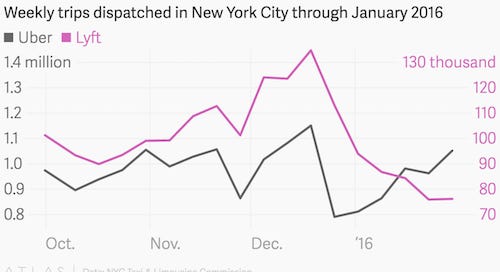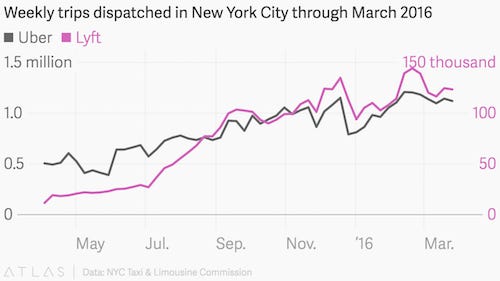Data fail.
Here in New York City, taxis, black cars, and ride-hailing companies alike are required to report data on rides to the Taxi & Limousine Commission, the local regulatory authority. Uber and Lyft are generally not fond of this requirement, which forces them to release detailed figures on the number of trips and unique vehicles they dispatch, but rules are rules, and to operate in New York they have to comply. Or do they? Since the start of the year, Lyft has been systematically misreporting its data to the TLC. It started in April, when the data the TLC released showed an increase in Uber’s rides during January but a noticeable decline in Lyft’s:
I was going to report this, as it seemed to contradict strong growth Lyft had recently described to Re/code, but held the story after an extensive back and forth. Lyft claimed the figures published by the TLC were inaccurate and underrepresented its January volume. The TLC after some inspection agreed, though it was unclear where the mistake was being made. Anyway, I had written it off as a fluke until last month—when it happened again! Here is a chart of the latest Uber/Lyft trip data released by the TLC:
As you can see, Lyft rides appear to have taken a steep tumble from February to March. At the same time, Lyft had just pushed out big new promotions in New York and been quoted in the Verge about its “fantastic year of growth” in the city. Once again, I was going to write it up—and once again, Lyft cried error. “The data submitted by Lyft to the TLC is not reflected accurately in this report,” they wrote to me. The TLC was more direct: They said Lyft had been improperly formatting its data and would need to “work through their submission problems.”
I recognize that this is all a bit in the weeds, but it seems relevant for two reasons. One, what good is data if the company reporting it is Doing It Wrong? Two, why hasn’t an operation as technologically savvy as Lyft been able to fix this problem? Lyft facilitates efficient on-demand rides and carpools; it should be able to deal with a couple of spreadsheet issues. Unless, of course, it doesn’t want to. If the goal is to avoid scrutiny from the media and competitors, systematic data errors could be awfully convenient.
Unsettled.
Thursday (June 2) will go down as a busy day in the annals of ride-hailing litigation. Uber was back in court in San Francisco, as was Lyft, both for hearings on their proposed settlements in class-action lawsuits over drivers’ employment status. In Uber’s case, US district judge Edward Chen didn’t indicate whether he would allow a $100 million settlement with drivers in California and Massachusetts to move forward. The proceedings reportedly put Shannon Liss-Riordan, the attorney representing drivers, on the defensive. “A lot of objectors have lined up to cast objections at me,” she said. “It’s very easy to cast stones from the outside.”
Next door, Lyft’s $27 million settlement proposal faced skepticism from US district judge Vince Chhabria, who worried that the amount might still be shortchanging drivers, despite the fact that it was double what the company originally offered.
Meanwhile, that same day in New York, the Taxi Workers Alliance filed a class-action complaint in federal court alleging once again that Uber had misclassified its drivers as independent contractors. The suit is being brought on behalf of 10 drivers and could represent as many as 5,000. It claims Uber has “severely harmed” drivers and “contributed greatly to a ‘race to the bottom.’ ” The Taxi Workers Alliance says it has also filed a complaint with the National Labor Relations Board questioning the arbitration agreements that Uber has its drivers sign.
And finally, here is the ever-wise Onion: New Uber Update Allows Users to File Lawsuit Against Company Directly in App.
Noir(e)bnb.
A few weeks ago, Airbnb was sued by Gregory Selden, a 25-year-old black man, for racial discrimination. Now the discrimination claims against it are piling up. Rohan Gilkes tried to book a house to visit a friend in Idaho. The host kept saying her place wasn’t available—until Gilkes had his white friend inquire. Or this white woman, who says she never had a problem booking with Airbnb until changing her account profile picture to include her black boyfriend. Here are more accounts from NPR. And this story from a trans woman who says she was turned down by a host who didn’t want her son “to feel any discomforts in his own home” over a trans guest.
Airbnb has reiterated in statements that discrimination “has no place in the Airbnb community” but the company is clearly at a loss for an immediate solution. In the meantime, frustrated consumers are taking matters into their own hands. Recently, two separate websites with nearly identical names—Noirebnb and Noirbnb—have popped up as aspiring home-sharing alternatives for people of color (and anyone else). The former is from Gilkes, the latter from two people who had the cops called on them by a neighbor while Airbnbing a home in Georgia last fall. The sense is that Airbnb, despite its formal statements, isn’t that concerned with sorting discrimination out. “They opened their doors and ears to us,” Noirbnb’s Ronnia Cherry tells BuzzFeed, “but I don’t think it was as much a priority within the company as it was a priority with the people.”
“Digital matching firms.”
We have lots of names for the “sharing economy,” basically none of which are any good. But the US government has come up with the worst yet: “digital matching firms.” It’s not just the phrase that’s mindbogglingly bad, but also the accompanying definitions. Per a report the Department of Commerce released last week, app-based companies that offer flexible jobs and user-based ratings systems will be counted as “digital matching firms,” but those that lack ratings systems or monetary transactions will not. Translation: Uber, yes, ditto Airbnb. But not Craigslist or Couchsurfing. I am all for precision, but these rules seem like they will only add to the confusion. I mean, what is Craigslist if not a “digital matching firm”? Yes, it’s not the same model as Uber, but that’s not what “digital matching firm” implies. If what you mean is “companies like Uber,” well, just say that.
Other stuff.
WeWork cuts staff, freezes hiring. Postmates eliminates on-site managers in some cities, can’t do math. “It’s like, is your product any good if people won’t pay more for it?” Hedge Fund Sold Fake Pre-IPO Uber Shares and Then Blew the Money on Strip Clubs and Sports, Claims SEC. Instacart partners with Food Network. Walmart taps Uber, Lyft for help with online grocery delivery. On-demand food heats up in Hong Kong. Lyft would like more corporate clients. Uber’s biggest investment ever is from Saudi Arabia. Uber builds a dock. Inside Uber’s subprime auto lending machine. Undercover Lyft With Shaquille O’Neal. Startup jargon synergies. Carpools for all. Waze vs. home owners. UberBike. Blue Apron IPO? The Felon Is Hot.
Thanks again for subscribing to Oversharing! If you, in the spirit of the sharing economy, would like to share this newsletter with a friend, you can direct them to sign up here. Header art by Maddie Schuette, who is available for hire. Send tips, comments, and sharing economy misnomers to oversharingstuff@gmail.com.






